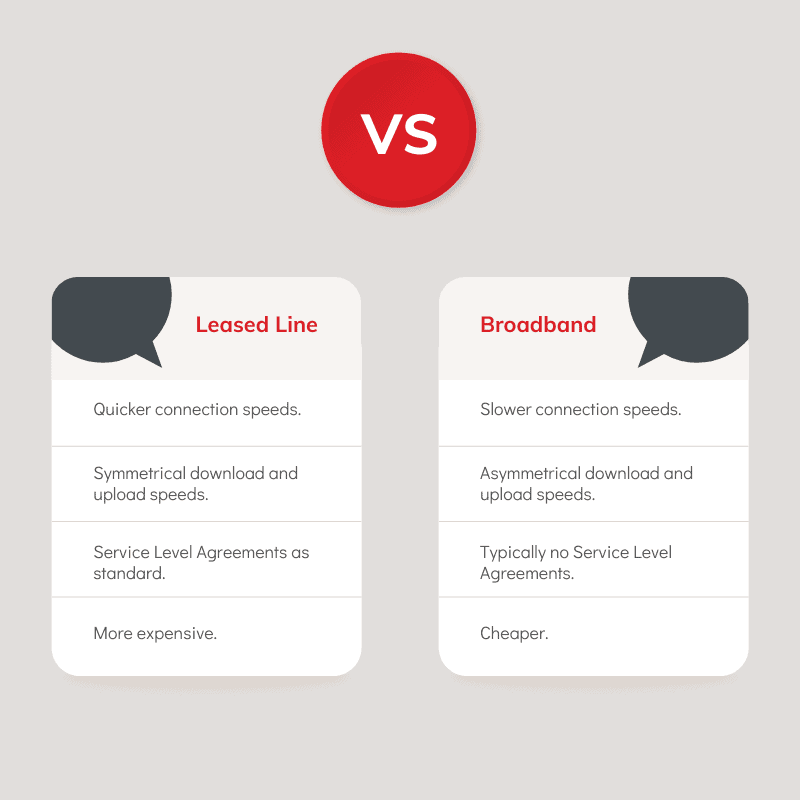The Difference Between Broadband and Leased Line Internet Connectivity.
There are many differences between broadband and leased line internet connectivity, which includes the following;
- The fundamental technology and way the internet connection works.
- The cost of the internet connection.
- The upload and download speeds of the connection.
- The reliability of the internet connection and what happens should the internet connection fail.
We’re frequently asked what is the best type of internet connection for a business, and whether broadband or leased line internet connectivity is better, and whilst there is no right or wrong answer per se, context can point you in the direction of the best type of internet connection for your specific needs.
Therefore, in this blog post, we have outlined some of the key differences between broadband and leased line internet connections, so you have a better understanding of what both are, what they offer, and most importantly, whether broadband or a leased line is better for you. As well as this blog post we also have a page dedicated to internet connectivity and the different types we provide.
The difference in technology between broadband and leased lines.
Many of the fundamental differences between broadband and leased line internet connectivity stem back to this core difference and the technology used to provide you the customer with your internet connection.
As a rule of thumb, most broadband connections (there are numerous sub-types of ‘broadband’ so we’re talking generically here) will be delivered via your Internet Service Provider (ISP) to a cabinet somewhere in your street or nearby. These cabinets are quite inconspicuous and usually painted in dull greens or greys, but if you look carefully, you will spot them. From there, a cable runs to your house or business and from there you have your broadband connection. Alternatively, with a leased line, you cut out the middleman. Your leased internet connection doesn’t go via a street cabinet but instead directly to you. Why does this matter? Contention!
Contention is the number of users competing for a connection. The more competition for that connection, the higher the contention and the worse the connection.
A leased line is a dedicated connection, and therefore there is no contention. Your business is connected directly to the local exchange and therefore you don’t share access with local residents or businesses. Conversely, broadband is not a dedicated connection and therefore you share your connection with others. In real terms, this reduces the connection speed and is why your household internet connection is likely to slow down during peak times such as the evening.
The difference in cost between broadband and leased lines.
Leased lines are typically more expensive than a broadband internet connection. However, you’re not comparing like-for-like products and therefore, whilst it’s only natural to compare the cost of two products, it’s more beneficial to consider the differences in value between broadband and leased line internet. Whilst your costs will increase if you move from a broadband connection to a leased line connection, you be paying for additional features and benefits (outlined in this post!) so always keep that in mind when performing a price comparison.
In addition to this, it is worth considering the different contracts you’re likely to see when agreeing to either a broadband connection or a leased line connection. In most situations, a leased line internet connection will tie you into a longer contract than that of a broadband connection. Typically, you will need to agree to a 36-month deal, but this isn’t always the case. When you purchase broadband internet, the contract terms will often be shorter and in the region of 12 to 24 months. These contract lengths both come with their own advantages and disadvantages. A longer-term deal brings greater stability and any price increases won’t affect you for a greater period of time. Conversely, if prices drop or you need to cancel the contract for any particular reason then you’ll be tied into a contract, which could be costly to leave.
With regards to cost, it’s also always prudent to consider any hidden costs that may arise when you’re using your connection. For example, a leased line connection will typically be unmetered and unthrottled. In other words, you can use it as much as you require without incurring any additional charges, typically under a ‘fair usage policy’. Broadband internet packages on the other hand can have a range of different policies in place that limits usage and/or charges you extra for going beyond certain limits. If you do agree to a new broadband internet connection always be sure to check all of the charges you may be liable for and whether they are likely to be relevant to your business.
The difference in connection speeds between broadband and leased lines.
Leased line internet will tend to get higher connection speeds when compared to your traditional broadband connection. However, in addition to this, leased lines provide you with symmetrical connection speeds too. This means that your download speed and your upload speed are the same.
With a traditional broadband connection, the download speed is a lot quicker than the upload speed. This isn’t a problem in your home environment as very rarely are you uploading large files or quantities of data. However, in a business environment, the increased upload speed of the leased line connection is a real benefit. In short, the easier it will be to upload data to the internet.
This is particularly useful if you utilise cloud technology, which is becoming increasingly common across businesses, most notably Microsoft cloud services. This increased upload speed will make the user experience a lot better, making for happier employees. It is also worth noting that large off-site backups can take hours over a traditional broadband internet connection, but they will inevitably be a lot quicker with a leased line internet connection. With off-site backup to cloud environments, such as Plymouth Science Park Data Centre, widely considered best practice, it shouldn’t be neglected in your considerations, as an off-site backup solution can be crucial in disaster recovery efforts. Similarly, new telephony technology such as VoIP that brings with it its own benefits over a more traditional phone system, may struggle to perform, or not be possible over a broadband internet connection. Your internet connection is a fundamental building block in the foundations of your IT network so its impact on performance for technical aspects should always be considered as well as any future plans or capital investments that may require an internet connection to function.
In addition to this leased line internet also provides fixed connection speeds, so you get exactly what you pay for, whereas with broadband, providers are only required to provide ‘best efforts’. This is why broadband promotions will often say something along the lines of ‘speeds of up to…’.
The difference in reliability between broadband and leased lines.
One of the fundamental and most important differences between a leased line internet connection and a broadband internet connection from a business perspective is that leased lines come with Service Level Agreements as standard and broadband connections do not. A Service Level Agreement is a minimum standard that you can expect from your provider, that also outlines what action the provider will take should the internet connection fail or fall short of those standards.
In real terms, this means that your provider will define how long fixes will take before you are due a pre-defined refund or compensation. It will also outline the minimum amount of uptime you can expect from your leased line connection. Alternatively, with broadband internet, you have no guarantees as to the time a fix will take, and you’re not always due a refund or compensation in the event of an outage. What’s more most leased lines will be actively monitored for issues, so that should they experience any problems, the Internet Service Provider can respond in a more timely fashion, as opposed to a broadband connection, which will require you to inform the provider about any issues.
This level of service is one of the key reasons why many businesses will opt for leased line internet over broadband. By knowing where you stand in advance of any issues, you are much better prepared. What’s more, you know precisely how long you are likely to have to wait for any fix and can act accordingly. Furthermore, with compensation often written into leased line deals, you know you are due recompense in the event of downtime, saving on costs. Alternatively, a faulty or unreliable broadband connection is likely to spiral in costs, in addition to causing your business additional productivity issues.
Leased line vs Broadband: Which is better for my business?
When considering leased lines vs broadband there is no hard and fast rule as to which is better. With that being said, we’d often recommend a leased line to businesses over broadband in most situations. Whilst a leased line costs more when compared to broadband, and will often tie you into a longer contract, we believe that the benefits of leased lines far outweigh the costs. A dedicated leased line supported by SLAs means you will have a robust internet connection that your business can rely upon. With businesses heavily reliant on their internet connection, this means that when comparing leased lines versus broadband, we think it’s crucial to opt for the leased line to ensure you protect the productivity of your business.
At Acronyms, we provide a wide variety of internet connectivity solutions. Therefore, if you’re not sure which to opt for when considering a leased line versus broadband please don’t hesitate to get in touch and speak to one of the team and we’ll be happy to provide our expert advice.






